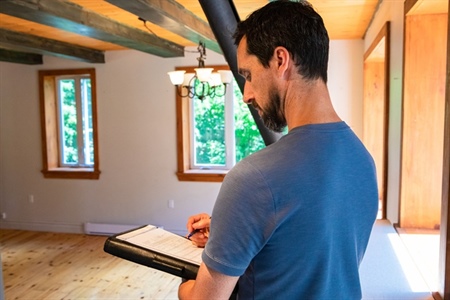What Are the Common Homeowner Mistakes to Avoid During a Home Inspection?

When preparing to sell a home, the home inspection is a critical step that can significantly influence the sale's outcome. Surprisingly, many homeowners unknowingly make errors that complicate or even jeopardize this crucial stage.
Mistakes made during a home inspection are common yet entirely avoidable with proper planning and knowledge. From inadvertently obstructing essential areas to attempting to conceal known problems, these oversights can lead to delays, decreased home values, and even canceled transactions.
In this article, we'll explore some of the most frequently overlooked mistakes homeowners make during inspections, helping you sidestep common pitfalls and ensure a smoother process. We’ll also consider whether it’s advisable for homeowners to stay present during inspections and examine the implications if dangerous conditions are discovered in your home.
Avoid Blocking Access to Crawl Spaces, Attics, and Electrical Panels
One common oversight homeowners make during home inspections is obstructing access to vital areas such as crawl spaces, attics, and electrical panels. Inspectors must evaluate these locations thoroughly to ensure the home's safety and compliance with standards. If inspectors cannot reach these areas, the inspection becomes incomplete, which may require rescheduling, causing unwanted delays.
Blocked access might suggest to potential buyers or inspectors that the homeowner is deliberately hiding defects or maintenance issues, even if that’s not the intent. Clearing these areas ahead of time ensures a comprehensive inspection, helping avoid misunderstandings or suspicions about concealed problems.
To facilitate a smooth home inspection, homeowners should proactively remove stored items, furniture, or other obstructions around key areas at least 24 hours before the inspector arrives.
How Being Unprepared for the Inspector’s Arrival Delays the Process
Homeowners who are unprepared for the inspector's visit often inadvertently prolong the inspection process. Essential tasks like clearing clutter, unlocking all doors, and ensuring pets are secured should be completed beforehand. When inspectors must wait for access or assist homeowners in preparing the property, it not only delays the inspection but also raises questions about the property's overall condition and care.
A prepared homeowner typically has all relevant paperwork—such as repair records, warranties, and previous inspection reports—organized and readily available. Without this documentation, inspectors and potential buyers might question the home's upkeep and maintenance history, possibly leading to further inspections or renegotiations.
Efficient preparation means fewer complications and a quicker, more effective inspection. It also enhances buyers’ confidence in the property, reflecting positively on homeowners' attention to detail and transparency.
Why Hiding Known Issues from the Inspector Is a Mistake
Some homeowners might believe that concealing known issues can help expedite their home sale. In reality, hiding defects discovered later by inspectors can severely damage credibility and trust, potentially compromising the sale entirely. Inspectors are trained to identify concealed problems, and any attempt at concealment typically results in heightened scrutiny.
Moreover, intentionally hiding defects might not only delay the home inspection but also lead to legal repercussions. Many states require homeowners to disclose known issues, and failure to do so could result in costly litigation, reduced selling prices, or canceled sales.
Transparency about known defects fosters goodwill and trust with buyers and inspectors alike. Addressing or openly disclosing these issues upfront usually leads to smoother transactions and fewer post-inspection negotiations.
Should Homeowners Be Present During the Entire Inspection Process?
While homeowners are not required to be present for the entire home inspection, doing so can provide benefits if handled correctly. Being available to answer questions or clarify uncertainties can streamline the inspection and avoid misunderstandings about certain home features or recent repairs.
However, homeowners should strike a balance. Constantly following inspectors or overly explaining issues may inadvertently raise red flags, suggesting insecurity about the property’s condition. Inspectors typically recommend that homeowners give them space to conduct their evaluations independently.
Homeowners who choose to be present should remain accessible but unobtrusive, allowing inspectors to perform their duties effectively and efficiently.
What Happens If the Inspector Finds Dangerous Conditions During the Inspection?
If inspectors discover hazardous conditions during a home inspection—such as faulty electrical wiring, mold, structural problems, or gas leaks—they are obligated to document and immediately communicate these findings to both the homeowner and the potential buyer. These conditions pose safety risks and typically need urgent attention.
Upon identification, such hazards usually require immediate remediation. Buyers might request that homeowners correct these dangerous conditions before proceeding with the sale, potentially delaying the transaction or leading to renegotiations on price and repair costs.
In severe cases, serious hazards discovered during inspections can terminate a transaction altogether if a resolution or compromise cannot be achieved. It's essential for homeowners to address significant safety concerns proactively, ensuring smooth negotiations and a successful sale process.
How DMC Home Inspections Can Help You Avoid These Common Mistakes
At DMC Home Inspections, our experienced team understands the critical role thorough inspections play in successful home transactions. We guide homeowners through each step of the inspection process, helping prevent costly mistakes such as blocked access, lack of preparation, and concealment of defects. With comprehensive inspection services, we ensure your home is accurately assessed, and potential issues are addressed transparently and efficiently.
If you're preparing for a home inspection, let our professional inspectors support you through the process, ensuring everything runs smoothly from start to finish. To schedule your inspection today, contact us at DMC Home Inspections, or give our office a call at 612-310-1692.